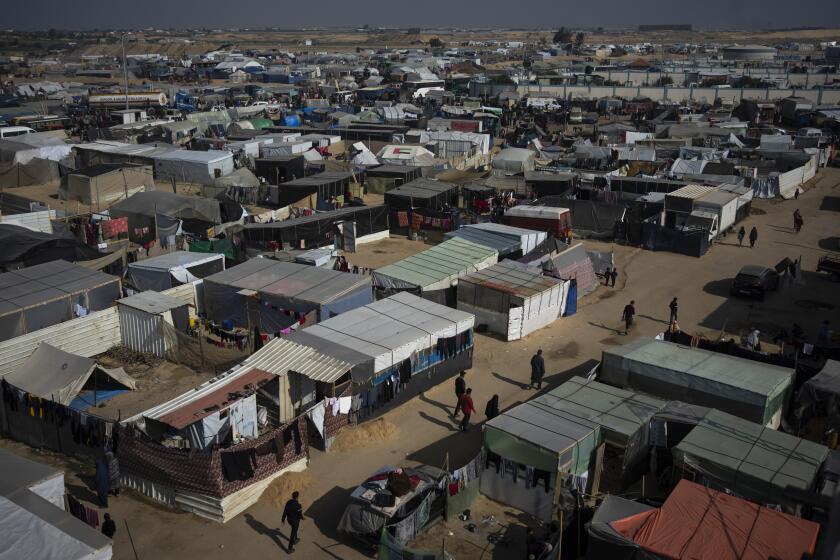Senator Alleges ‘Sloppy’ Work on MIA Issue
A senior Senate Republican, saying he believes evidence suggests that American prisoners are still alive in Vietnam, accused Pentagon investigators Sunday of doing a sloppy job investigating reports of “live sightings” of the missing men.
But Sen. Robert C. Smith (R-N.H.) also appeared to be moderating his opposition to the lifting of a U.S. trade embargo against the Vietnamese government. That could provide significant ammunition for President Clinton when the question of renewing the trade ban comes up in September.
Smith said it appears that because U.S. intelligence could not find the prisoners he believes are still being held, “maybe normalization is the answer.”
Veterans groups and relatives of Americans listed as missing in action in Vietnam have opposed lifting the embargo on the grounds that it is the only leverage the United States has to force the Vietnamese to provide more information about their fate. Smith’s comments appeared to suggest a sea change in the thinking of some holding that position.
Vietnam again flatly denied Sunday that it is holding any American prisoners, the Reuters news service reported from Hanoi.
“There’s no proof whatsoever that there were prisoners and particularly prisoners still alive and being kept in Vietnam,” Deputy Foreign Minister Le Mai said at a Hanoi news conference. “I would like to assure you Vietnam has no business whatsoever to keep any prisoner now.”
Smith said he was given the same assurance when he met Communist Party General Secretary Do Muoi.
Clinton took a major step on the road to normalizing relations with Vietnam 10 days ago when he announced that the United States would no longer block other countries from settling Vietnam’s debt with the International Monetary Fund. The move cleared the way for international agencies such as the World Bank to resume lending to Vietnam and for other countries such as Japan, which had observed the U.S. embargo, to begin providing bilateral assistance.
Paradoxically, despite Smith’s musings that normalization might provide more information about the fate of Americans missing in Vietnam, his charges about the Pentagon’s handling of the investigations are likely to make it politically harder for Clinton to lift the embargo.
Clinton said he is sending a high-level delegation, headed by Assistant Secretary of State Winston Lord, to Vietnam later this month to press the Vietnamese to release more details about the fate of the missing.
Smith, who has criticized Vietnam’s handling of the prisoner issue, acknowledged that he may have been the first beneficiary of the new U.S.-Vietnamese relationship during his four-day visit because he received unprecedented access to locations and people.
Smith was accompanied on the trip by Robert Garwood, a former Marine who was captured by the Viet Cong and subsequently court-martialed for collaborating with the enemy after his return to the United States in 1979. Garwood has testified that he saw what he believed to be U.S. prisoners of war being held in northern Vietnam after the war ended in 1975.
Smith said that Garwood led him to a complex at Thac Ba Lake, north of Hanoi, which he had described in Senate testimony as a place where he had seen U.S. prisoners being held. An investigation by the Defense Intelligence Agency, which handles the so-called “live sighting” reports, had concluded that no such facility existed at Thac Ba Lake.
Garwood said Sunday that he now feels vindicated because “from 1979 to date, everything I claimed that I’d seen was debunked. They said it was a lie or a fabrication. This was my last opportunity to prove that it was true.”
Smith said he visited another prison facility that had been mentioned by Vietnamese refugees as a place where Americans were being held but that Pentagon investigators had said did not exist.
Smith said that “sensitive satellite imagery” as recently as 1992 indicated that Americans were still being held against their will in Vietnam, a charge that Vietnam vehemently denies and that foreign diplomats in Hanoi view as incredible.
“We’re not doing the job right,” Smith said of the Defense Intelligence Agency investigations of the live-sighting reports. “Either we don’t have good intelligence capability or they’re just doing a sloppy job. I think it’s the latter.”
He said the sloppiness is “very pervasive.”
Smith said that by normalizing relations, the United States may eventually learn more about the missing Americans than if the embargo is left in place. But he said he would prefer improved intelligence gathering.
Smith said he is calling on the Justice Department to consider criminal charges against a number of individuals for false testimony made to the Senate Select Committee on POW-MIA Affairs, of which he was vice chairman. The committee’s final report said there was no hard evidence that U.S. prisoners were still being held in Vietnam.
More to Read
Sign up for Essential California
The most important California stories and recommendations in your inbox every morning.
You may occasionally receive promotional content from the Los Angeles Times.






